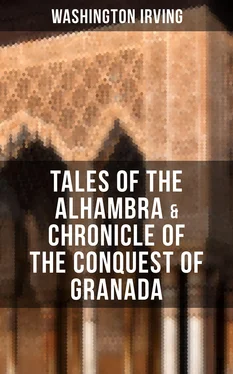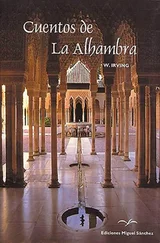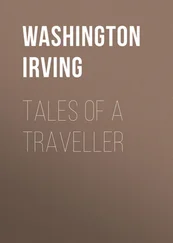“Son of Abu Ayub,” exclaimed Aben Habuz, “thou hast been a great traveller, and seen marvellous things; but of what avail to me is the secret of the pyramid, and the volume of knowledge of the wise Solomon?”
“This it is, O king! By the study of that book I am instructed in all magic arts, and can command the assistance of genii to accomplish my plans. The mystery of the Talisman of Borsa is therefore familiar to me, and such a talisman can I make; nay, one of greater virtues.”
“O wise son of Abu Ayub,” cried Aben Habuz, “better were such a talisman, than all the watchtowers on the hills, and sentinels upon the borders. Give me a safeguard, and the riches of my treasury are at thy command.”
The astrologer immediately set to work to gratify the wishes of the monarch. He caused a great tower to be erected upon the top of the royal palace, which stood on the brow of the hill of the Albaycin. The tower was built of stones brought from Egypt, and taken, it is said, from one of the pyramids. In the upper part of the tower was a circular hall, with windows looking towards every point of the compass, and before each window was a table, on which was arranged, as on a chess-board, a mimic army of horse and foot, with the effigy of the potentate that ruled in that direction, all carved of wood. To each of these tables there was a small lance, no bigger than a bodkin, on which were engraved certain Chaldaic characters. This hall was kept constantly closed, by a gate of brass, with a great lock of steel, the key of which was in possession of the king.
On the top of the tower was a bronze figure of a Moorish horseman, fixed on a pivot, with a shield on one arm, and his lance elevated perpendicularly. The face of this horseman was towards the city, as if keeping guard over it; but if any foe were at hand, the figure would turn in that direction, and would level the lance as if for action.
When this talisman was finished, Aben Habuz was all impatient to try its virtues; and longed as ardently for an invasion as he had ever sighed after repose. His desire was soon gratified. Tidings were brought, early one morning, by the sentinel appointed to watch the tower, that the face of the bronze horseman was turned towards the mountains of Elvira, and that his lance pointed directly against the Pass of Lope.
“Let the drums and trumpets sound to arms, and all Granada be put on the alert,” said Aben Habuz.
“O king,” said the astrologer, “Let not your city be disquieted, nor your warriors called to arms; we need no aid of force to deliver you from your enemies. Dismiss your attendants, and let us proceed alone to the secret hall of the tower.”
The ancient Aben Habuz mounted the staircase of the tower, leaning on the arm of the still more ancient Ibrahim Ebn Abu Ayub. They unlocked the brazen door and entered. The window that looked towards the Pass of Lope was open. “In this direction,” said the astrologer, “lies the danger; approach, O king, and behold the mystery of the table.”
King Aben Habuz approached the seeming chess-board, on which were arranged the small wooden effigies, when, to his surprise, he perceived that they were all in motion. The horses pranced and curveted, the warriors brandished their weapons, and there was a faint sound of drums and trumpets, and the clang of arms, and neighing of steeds; but all no louder, nor more distinct, than the hum of the bee, or the summer-fly, in the drowsy ear of him who lies at noontide in the shade.
“Behold, O king,” said the astrologer, “a proof that thy enemies are even now in the field. They must be advancing through yonder mountains, by the Pass of Lope. Would you produce a panic and confusion amongst them, and cause them to retreat without loss of life, strike these effigies with the but-end of this magic lance; would you cause bloody feud and carnage, strike with the point.”
A livid streak passed across the countenance of Aben Habuz; he seized the lance with trembling eagerness; his gray beard wagged with exultation as he tottered toward the table: “Son of Abu Ayub,” exclaimed he, in chuckling tone, “I think we will have a little blood!”
So saying, he thrust the magic lance into some of the pigmy effigies, and belabored others with the but-end, upon which the former fell as dead upon the board, and the rest turning upon each other began, pell-mell, a chance-medley fight.
It was with difficulty the astrologer could stay the hand of the most pacific of monarchs, and prevent him from absolutely exterminating his foes; at length he prevailed upon him to leave the tower, and to send out scouts to the mountains by the Pass of Lope.
They returned with the intelligence, that a Christian army had advanced through the heart of the Sierra, almost within sight of Granada, where a dissension had broken out among them; they had turned their weapons against each other, and after much slaughter had retreated over the border.
Aben Habuz was transported with joy on thus proving the efficacy of the talisman. “At length,” said he, “I shall lead a life of tranquillity, and have all my enemies in my power. O wise son of Abu Ayub, what can I bestow on thee in reward for such a blessing?”
“The wants of an old man and a philosopher, O king, are few and simple; grant me but the means of fitting up my cave as a suitable hermitage, and I am content.”
“How noble is the moderation of the truly wise!” exclaimed Aben Habuz, secretly pleased at the cheapness of the recompense. He summoned his treasurer, and bade him dispense whatever sums might be required by Ibrahim to complete and furnish his hermitage.
The astrologer now gave orders to have various chambers hewn out of the solid rock, so as to form ranges of apartments connected with his astrological hall; these he caused to be furnished with luxurious ottomans and divans, and the walls to be hung with the richest silks of Damascus. “I am an old man,” said he, “and can no longer rest my bones on stone couches, and these damp walls require covering.”
He had baths too constructed, and provided with all kinds of perfumes and aromatic oils: “For a bath,” said he, “is necessary to counteract the rigidity of age, and to restore freshness and suppleness to the frame withered by study.”
He caused the apartments to be hung with innumerable silver and crystal lamps, which he filled with a fragrant oil, prepared according to a receipt discovered by him in the tombs of Egypt. This oil was perpetual in its nature, and diffused a soft radiance like the tempered light of day. “The light of the sun,” said he, “is too garish and violent for the eyes of an old man, and the light of the lamp is more congenial to the studies of a philosopher.”
The treasurer of King Aben Habuz groaned at the sums daily demanded to fit up this hermitage, and he carried his complaints to the king. The royal word, however, had been given; Aben Habuz shrugged his shoulders: “We must have patience,” said he, “this old man has taken his idea of a philosophic retreat from the interior of the pyramids, and of the vast ruins of Egypt; but all things have an end, and so will the furnishing of his cavern.”
The king was in the right; the hermitage was at length complete, and formed a sumptuous subterranean palace. The astrologer expressed himself perfectly content, and, shutting himself up, remained for three whole days buried in study. At the end of that time he appeared again before the treasurer. “One thing more is necessary,” said he, “one trifling solace for the intervals of mental labor.”
“O wise Ibrahim, I am bound to furnish every thing necessary for thy solitude; what more dost thou require?”
“I would fain have a few dancing women.”
“Dancing women!” echoed the treasurer, with surprise.
Читать дальше












